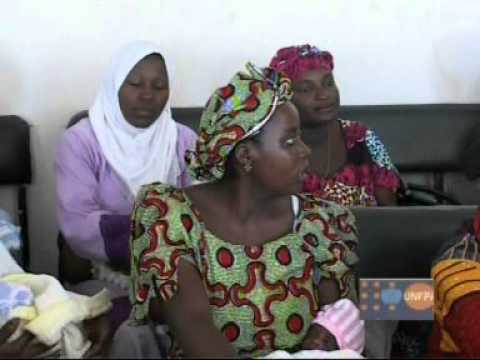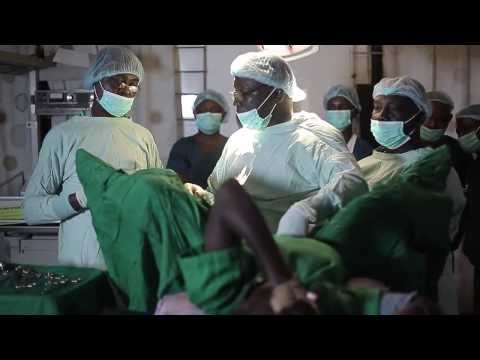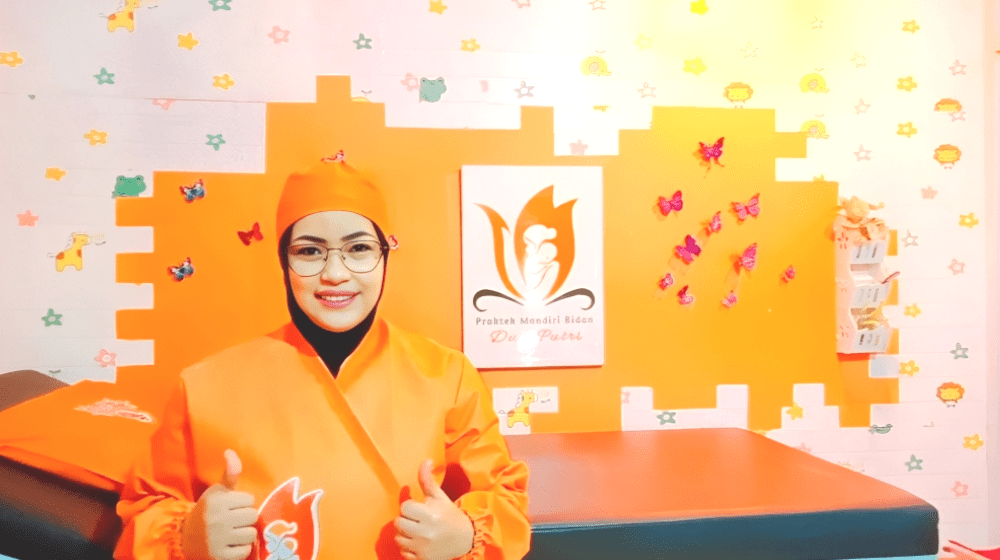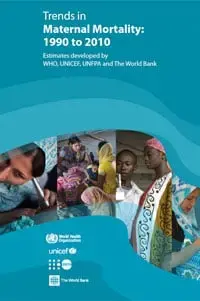The COVID-19 pandemic has made the provision of sexual and reproductive health services more challenging. However, midwife Nur Hidayah, known by her nickname Bidan Aya, does not let these challenges deter her. The 36-year-old village midwife from Sidenreng Rappang, South Sulawesi, who has been providing services at her private clinic in Sidenreng Rappang for 11 years, is determined to do her best to serve her patients.
Bidan Aya continues to develop herself and innovate. The training she participated in as part of UNFPA’s Leaving No One Behind (LNOB) programme helped her respond to the challenges brought about by the health crisis.
Challenges in delivering services during the pandemic
Bidan Aya admitted that the beginning of the COVID-19 pandemic was tough for her. The lack of knowledge on how to handle COVID-19 led to worries and confusion. In 2020, she assisted in a delivery where the patient later tested COVID-19 positive. "I wore PPE (personal protective equipment, ed.) when I helped with the delivery, but was still worried,” she recalled. “After that, I shut down my practice for three days. My assistant and I underwent self-isolation until we received our COVID-19 test results.”
That incident reminded her that her job exposes her and her staff to the risks of COVID-19 transmission. “We cannot just assume that a patient is fine, because someone who looks just fine could be COVID-19 positive.”
Despite the fear of COVID-19, Bidan Aya is committed to providing her services with strict precautions. If a patient does not exhibit any symptoms but still may be COVID-19 positive, Bidan Aya advises them to avoid visiting the clinic to prevent the virus from spreading. Instead, she offers online consultations through Whatsapp and Instagram.
Furthermore, she recommends that pregnant women follow the guidelines in the Maternal and Child Health (KIA) handbook and remain alert for any pregnancy-related risks.
"If they experience any concerning symptoms, I advise them to seek immediate medical attention at our midwifery practice but only after scheduling an appointment," she explained.
The inspiring and life-changing training

In August 2021, Bidan Aya enrolled herself in a midwifery training organised by the University of Indonesia’s Faculty of Public Health (FKM UI) and the Indonesian Midwife Association (IBI) with support from UNFPA and the Government of Japan. The training was part of the “Leaving No One Behind” (LNOB) programme, which ensured the continuity and inclusivity of access to sexual and reproductive services for people most impacted by the COVID-19 pandemic.
Bidan Aya did not expect that the training would teach her new knowledge in ways she had never experienced before. She admitted that the training significantly increased her knowledge on personal protective equipment and infection management.
“The training turned out to be extraordinary… I like joining webinars and training, but this one is different, because really, this training is really good!"
“When I saw the list of the participants, I just realised that many participants are from all over Indonesia.. Eight training modules, delivered in five days. From module 1 to 8, we learned the basics,” she recalled. “About the pandemic, antenatal care (ANC), services during COVID-19, delivery, contraception, medical waste management, psychosocial support, and infection prevention. They’re all very relevant to the current situation and very well delivered by the trainers,” she continued.
The discussions in break-out rooms and WhatsApp groups with other participants inspired Bidan Aya to create 'Paman Maco'. The catchy acronym stands for “Papan Pengumuman Praktik Mandiri Bidan (PMB) Cegah COVID” (“Independent Midwifery Practice’s Announcement Board for Preventing COVID”), a board displaying information on COVID-19 prevention and vaccination for visitors to her clinic.
She also received constructive feedback for “Kurindu Bumil,” a WhatsApp group that she initiated and has been used to communicate with expecting mothers. Established before the pandemic, Bidan Maya initially used "Kurindu Bumil", which in Indonesian literally translates to "I miss pregnant mothers" but is actually an abbreviation that stands for "pregnant mothers’ routine gathering after visiting integrated healthcare centre," to share information on pregnancy classes and ultrasonography (USG) schedules. The platform later grew its function to connect its participants to healthcare providers, including midwives, general practitioners, and obstetricians/gynaecologists (OBGYNs).
The participants, who joined the group from when they were pregnant until their babies have grown into 5-year-olds, can ask questions about their health concerns on the platform. The importance of this online communication platform grew further as the pandemic intensified. Now, more than 300 participants have joined the group.

For Bidan Aya, trying new methods in providing sexual and reproductive health services is important to ensure that no pregnant woman or young person is left behind in access to health services."If you don't innovate, it means you are stuck in place, there is no progress. We should innovate to support local community health centres. For example, to motivate pregnant women to routinely take iron supplements," she suggested.
"Pregnant women used to not take iron supplements regularly. In 2018-2019 there were 12 bleeding cases, 2 maternal deaths, and 5 low birth weight babies (LBW). Consuming iron supplements can reduce bleeding rates, miscarriages, LBW, and maternal deaths."
Turning inspiration into action
Furthermore, the respectful midwifery principles taught during her training caused Bidan Aya to reflect on her treatment of patients. “Before this training, sometimes I felt irritated when patients came in the middle of the night, when I was exhausted,” she recalled. “I have learned that I was not supposed to behave that way with the community members, and especially my patients. The training taught me ways to regulate my emotions… I hope I can have more patience now,” she said.
Bidan Aya acknowledged that being a midwife in a village involves being ready to serve as a healthcare provider, friend, counsellor, and public health promoter. “Aside from those intense duties, we still have a family to take care of, and now, COVID.” Fortunately, the training also reminded her to take care of herself. “After the training on mental health and self-care, I took a vacation with my husband and gave leave days to my assistant.”
During the training, she also learned about gender-based violence (GBV) and other harmful practices. The module made Bidan Aya realize that female genital mutilation (FGM) and child marriage practices that are still common in her area are actually harmful to women and girls.

"Female circumcision is also common… I discussed what happened here with the trainers and other participants during the training, and they agreed that we need to end FGM because it’s harmful,” she continued.
“I also coordinated with the Women’s Empowerment and Child Protection District Office to discuss female circumcision. It is part of our tradition, but we will try to change it, slowly.”
“There are a lot of adolescent pregnancies here. In 2018, there were 15 teenagers who got pregnant, five of which happened out of wedlock... Some of them were only 13 years old, and had to have a cesarean section because their pelvis was still small,” she recalled. "A child dropping out of school can be seen as a signal that they are ready for marriage. For example, if you don't go to junior or senior high school, it means you are waiting to be proposed to," Bidan Aya explained the prevalence of child marriage in her village.
This realisation inspired her to reach out to adolescents and establish a reproductive health network for educating girls, named after a famous martial art comic book character, "Wiro Sableng 212". The name represents an education centre for adolescent girls to prevent early pregnancy through reproductive health education and stunting prevention. She uses the number "2+1+2" to refer to the five essential elements of adolescent reproductive health in her village: 1) weighing and physical examination, 2) contraceptive pills to delay pregnancies among married adolescents, 3) education for grandparents who raise adolescents, 4) literacy for adolescents (reproductive health books), and 5) a control card for anaemia among adolescents.
“I have identified 58 young girls who were already out of school, and started to educate them on reproductive health to prevent sexual violence and child marriage.”
“I hope it will turn out well and help them to think of other options for their future, and to shift their focus from seeing marriage as the only option available to them,” she affirmed. Bidan Aya also coordinates with local community health personnel to conduct a monthly health examination for young people.
The journey goes on
Despite Bidan Aya's innovation and hard work, she still faces significant challenges.
“From those eight modules, the hardest one to implement is the prevention of sexual violence and child marriage.”
Bidan Aya has attempted to prevent child marriages in her village, but institutions have given permission for the marriages, despite her testimony about the children's unfitness for marriage.
“If only we could implement all eight modules of the training, then it would be possible for us to reach zero maternal and neonatal death… but it is impossible for me to do everything on my own,” she says.“But I am not giving up. I will continue my service and innovation,” she concluded optimistically.
Asri Wijayanti, (Former) Communications and Knowledge Management Officer,
LNOB Programme
Ria Ulina, Sexual and Reproductive Health in Emergency Officer
UNFPA Indonesia





